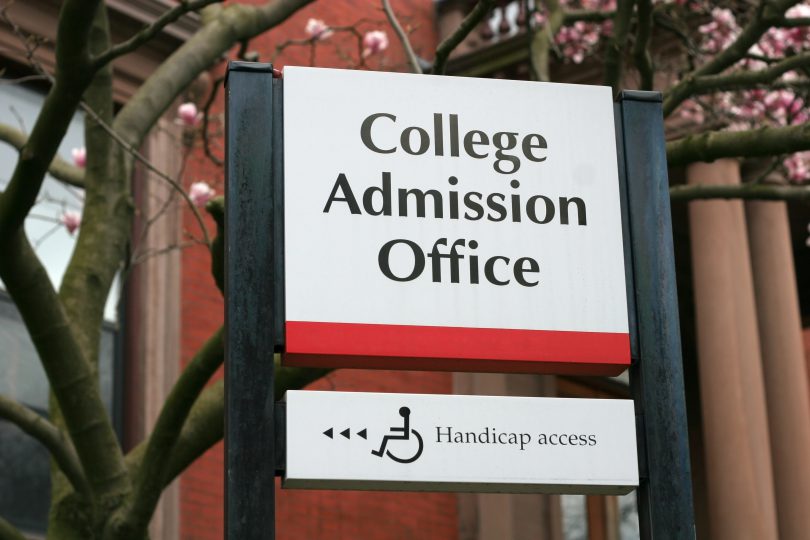There’s no better way to get a feel for a college than to get on its campus. We suggest you get onto college campuses early and often. Taking lots of campus visits will help you get a better feel for the type of college environment that is right for you. We’ve talked to many college players about their recruiting experience and they almost always advise future prospects to take lots of campus visits and if possible, use their official visits. A campus visit can be anything from strolling around campus as part of your family vacation to having an expense-paid official visit by the school. Below we explain some of the different types of campus visits, and why it’s important to get on as many campuses as possible.
Unofficial Visits
A campus visit that is paid for at the expense of the recruit and his family is considered an unofficial visit. A recruit can take unlimited unofficial visits. An unofficial visit could mean anything from walking around campus on a whim to an invitation to attend a home athletic event, or even a full campus tour and sit-down meeting with the baseball coaching staff. We differentiate between formal (set up with the coaches) and informal (going on your own), but the key to a visit being ‘unofficial’ is that the recruit pays his way. Recruits may take informal unofficial visits at any time, but the rules have changed on formal unofficial visits set up by the coaches for the D1 level. Here’s a level-by-level breakdown:
D1
NCAA legislation has changed the D1 recruiting rules so that formal unofficial visits (with any intentional contact between the recruit and the coaching staff or players) now must take place no earlier than September 1 of a recruit’s junior year of high school. The only expense a recruit may receive from the college on an unofficial visit is 3 complimentary tickets to a home athletic event, which also can only happen after September 1 of a recruit’s junior year.
D2/D3/NAIA
Unofficial visits to schools in these levels of college baseball may take place at any time, even if they are formally set up with the coaching staff. There are no restrictions to the timing, age, or grade of recruits.
Overnight Unofficial (All Levels)
Even on an unofficial visit, it may be possible for you to stay with current players in a dorm. There are different rules for overnight unofficial visits, depending on school housing for prospective students and level designation. Make sure you speak with the coaching staff about whether this is an option and what it will cost.
Official Visits
An official visit is any visit to a college campus paid for by the school. Official visits can last up to 48 hours and can include transportation costs to and from the school, room and board during the trip for the recruit and his parent or guardian, and ‘reasonable entertainment expenses’ during the trip, including 3 complimentary tickets to a home athletic event. In order to take an official visit, recruits must be registered with the NCAA Eligibility Center, and have provided the hosting school with copies of your high school transcript and ACT or SAT test scores (if required). It’s important to note that official visits are different at every school and some programs are limited in the financial assistance they are able to provide to recruits. Make sure you are clear on what a program will be able to pay for before taking your visit.
D1
D1 official visits may be made starting September 1 of a recruit’s junior year of high school, the same time period as formal unofficial visits. High school recruits may now take unlimited official visits, but only 1 to each program (unless there is a head coaching change and a new visit is allowed).
D2
D2 official visits may be made starting June 15 of the summer prior to a recruit’s junior year. Recruits may take an unlimited number of official visits to D2 programs.
D3
D3 official visits are allowed starting January 1 of a recruit’s junior year. Like D2 official visits, a recruit may take unlimited D3 official visits.
Why Campus Visits are Important
Campus visits of all kinds are great for getting a grasp on the vibe of a particular school or just college in general. Taking visits is an integral part of finding a college fit. As Chris Paul, the Minnesota Twins 2015 6th round draft pick and former college standout advises, “I would encourage kids to take all their visits if they have that opportunity because you kind of get a more accurate experience with the school.” In interviews with KPB, Paul and former Cal teammate Mitchell Kranson both spoke about the importance of visiting college campuses during their respective recruiting processes. Each took informal visits with their family as part of baseball trips or even family vacations and more formal visits set up with the coaching staff. Like many recruits, these trips helped them refine their interests and preferences in the college baseball search.
How to Set Up a Campus Visit
There are a lot of different restrictions on visits to college campuses during this uncertain time. The very first thing you’ll need to do is find out whether or not a campus visit is even possible. You’ll also want to discuss the safety of any visits with your parents or other trusted adults. Once a visit is possible and safe, you’ll want to know more how to set one up. Here are some important tips.
You don’t need an invite from a college coach to visit campus, although meeting with the coaches and touring the baseball facilities is the opportunity you are looking for! Here are some of the common ways visits are made:
Informal Visit
In your freshman/sophomore years, we suggest informally visiting college campuses. Take the guided tour of campus or tour it yourself, hang out in the student-center or grab lunch on campus. If you can, go during a time when you might be able to see the baseball team practice or play (although you can’t set this up with the coaches until September 1 of your junior year). Get used to being on different campuses and get a feel for what things you like and dislike. Informal visits do not have to be limited to the first 2 years of high school and are a great precursor for the ultimate goal—setting up a formal visit with the coaches.
Formal Visit Initiated by You
As you get into your upperclassmen (junior and senior) years and your list of schools narrows, try to set up formal campus visits with the coaches. To successfully do this, the timing has to be right and it is essential you contact schools at the appropriate level of play. Use our When to Contact College Coaches as a guide to help make sure you are ready to contact coaches and Contacting Coaches the Right Way to give your email the best chance of being read. If you have no prior relationship with the coach, setting up a formal visit can be difficult. It’s best to develop a rapport with the coaches first and conjure up interest before setting up a formal visit. However, if you are intent on visiting regardless, you should email the coach to let him know you will be coming to campus and see if he is willing to meet with you and show you around. Make sure you CC all the coaches on the staff in your email. Don’t be surprised if you receive no response. Coaches receive dozens of interest emails each day, so emailing out of the blue is a low percentage play. If you do receive interest from a coach, it is always smart to try to use that as an opportunity to set up a campus visit.
Formal Unofficial/Official Visit Initiated by the Coach
If a coach personally invites you to visit campus, it is a sign that they are seriously considering you as a prospect. In this case, they will likely usher you through the entire visit and all you have to do is show up prepared. Read KPB’s How to Ace a Campus Visit so you show up prepared and ready to go!
For all campus visits that happen during the school year, try to visit on a day when you can watch a practice or game, if possible.
A Word of Caution:
Campus visits with interested coaches can often speed up the recruiting timeline and may be one of the last stepping-stones for a coach before they make you an offer or put pressure on you to make a decision. Remember, you control the decision to commit, and you shouldn’t commit until you are 100% ready. It’s easy to get caught up in the emotions of a good visit and get pressured into making a hasty decision. Plan on taking some time to reflect on the visit at home when it’s finished before making any big decisions.







